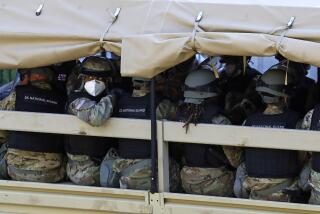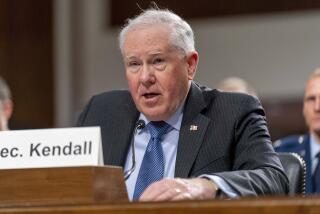Military Fights for Freer Role in Covert Operations
- Share via
WASHINGTON — An intense battle is raging within the Administration over whether to grant broader freedom to military special operations forces to gather intelligence, preempt terrorism and combat drugs overseas, according to government sources.
The military’s elite special forces want greater latitude to carry out secret missions in other countries without first submitting their plans to what the military considers a cumbersome review process overseen by the CIA director.
Military sources said that intelligence shortcomings in the December invasion of Panama dramatized a problem that they have increasingly encountered in trying to conduct effective secret operations under the current system.
Had the CIA system not imposed strict limits on contacts between U.S. and Panamanian military officers, the sources said, American commanders in Panama might not have been as surprised by the intensity of opposition put up by some Panamanian Defense Forces units.
The CIA is extremely sensitive about and protective of human intelligence collection efforts and frequently vetoes person-to-person contacts by other agencies, a number of military officers said.
But critics argue that strict controls over clandestine operations must remain in place to prevent rogue military officers from carrying out unauthorized and dangerous adventures overseas.
The dispute has intensified in recent months as the Soviet threat recedes and the Pentagon seeks to redirect its efforts from traditional military operations to deeper involvement in fighting drugs, terrorism and other unconventional threats.
The current dispute is part of a long-running battle between America’s highly trained secret warriors and those in the bureaucracy and Congress who want to keep them on a short leash.
Right now, the bureaucrats and the lawmakers have the upper hand over the operators, both sides in the dispute agree. In the past, however, the covert operators have been given greater autonomy and have delivered a catalogue of national disasters, from the Bay of Pigs invasion to the failed plot to assassinate Cuban leader Fidel Castro.
Army Gen. James J. Lindsay, head of the U.S. Special Operations Command, and some other military officers are advocating relaxation of the complex set of regulations that has governed secret intelligence-gathering activities since the widely publicized CIA scandals of the mid-1970s, sources said.
The regulations cover clandestine activities abroad that fall short of long-term intelligence operations or covert actions that require presidential authorization and formal notification of Congress. The clandestine activities include such things as contacts with potential informants, reconnaissance of suspected drug or terrorist operations and what the military calls “tactical” or “foxhole” intelligence relating to an ongoing or expected military operation.
The current rules, known as Director of Central Intelligence Directives, require that all such “special activities” be reported to and approved by officials within the Defense, State and Justice departments, as well as the Joint Chiefs of Staff, the White House, the CIA and the ambassador in the country involved.
It now takes as much as a month for a routine request to wend its way through the bureaucracy, officials said. Even emergency requests take more than 24 hours, jeopardizing strikes against terrorists and hostage-takers, they complained.
Officials at any of the agencies can delay and even, in effect, veto proposed actions by raising objections on a variety of grounds, those familiar with the process say.
“We see this happen on almost every single thing that comes through,” one senior Pentagon civilian involved in the reviews said. “The degree of caution is almost hard to describe.
“It’s blocking all sorts of day-to-day things to enhance our counterterrorism efforts,” including routine requests for authority to conduct surveillance of terrorist suspects, the official said.
The CIA chief holds one-man veto power without any obligation to state the reasons for his objections, and that veto is exercised frequently, military officers complained.
A Pentagon spokesman acknowledged that a review of special operations oversight was under way at the Defense Department and that it has sparked considerable debate among intelligence specialists within the Administration.
James R. Locher, the assistant secretary of defense for special operations, is preparing a report for the Senate Intelligence and Armed Services committees on “the appropriate balance between effective oversight and the conduct of intelligence activities in support of military special operations,” the Pentagon spokesman said. The study is due at the end of April, he said.
One congressional official familiar with the dispute said that there is “an inherent conflict of interest at the (CIA) when it comes to allowing another agency to do something that might jeopardize (intelligence) collection. The bureaucratic answer is not to allow it.
“This is a very important issue,” said the official, a former military special operations officer. “You will see a tough fight to make the military look as bad as possible. They’ll be portrayed as rogues.”
A spokesman for Gen. Lindsay said that the military Special Operations Command is not trying to unshackle itself but merely “trying to clarify the rules and procedures so there’s no confusion.”
“We don’t consider ourselves to be in the intelligence-gathering business. We have no interest in circumventing the oversight process for intelligence gathering. That’s not our business,” Lt. Col. Jake Dye of the Tampa, Fla.-based command said.
But knowledgeable sources said that Lindsay and other military advocates of freer action in support of U.S. interests overseas believe that there should be a streamlined approval within the Pentagon process for relatively low-risk military-run operations.
“There’s a lot of frustration expressed by people in (the Department of Defense), especially the operators. A lot of these guys are quite action-oriented, to say the least, and can’t understand why a perfectly good plan has to be held up while some bureaucrat has to chop on it,” said a source on Capitol Hill who has watched the fight brewing over the last several months.
“What they don’t seem to realize is (that we want to make sure) somebody doesn’t go off and do something stupid and get the United States in trouble.”
In addition to concerns being voiced by the CIA, the State Department and Congress, one knowledgeable source said, “they’re by no means unanimous even in the Defense Department.”
Several sources said that Lindsay himself has not clearly defined whether he believes that special operations forces should be exempted from the process entirely or whether the interagency review should merely be speeded up.
However, Congress is certain to balk at any proposal to relax oversight significantly.
Rep. Dave McCurdy (D-Okla.), who is chairman of the House Intelligence Committee’s subcommittee on oversight, said that special operations forces are “the new kids on the block and they’re trying to test their limits. They’re looking for as much flexibility, as much freedom and much latitude as they can get. Seeking exemption from oversight is neither going to occur nor is it desirable.
“They’re going to learn to realize that they may be special, but they’re not that special,” McCurdy added.
More to Read
Sign up for Essential California
The most important California stories and recommendations in your inbox every morning.
You may occasionally receive promotional content from the Los Angeles Times.











